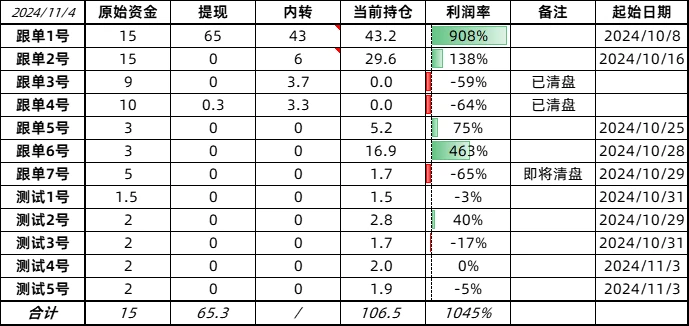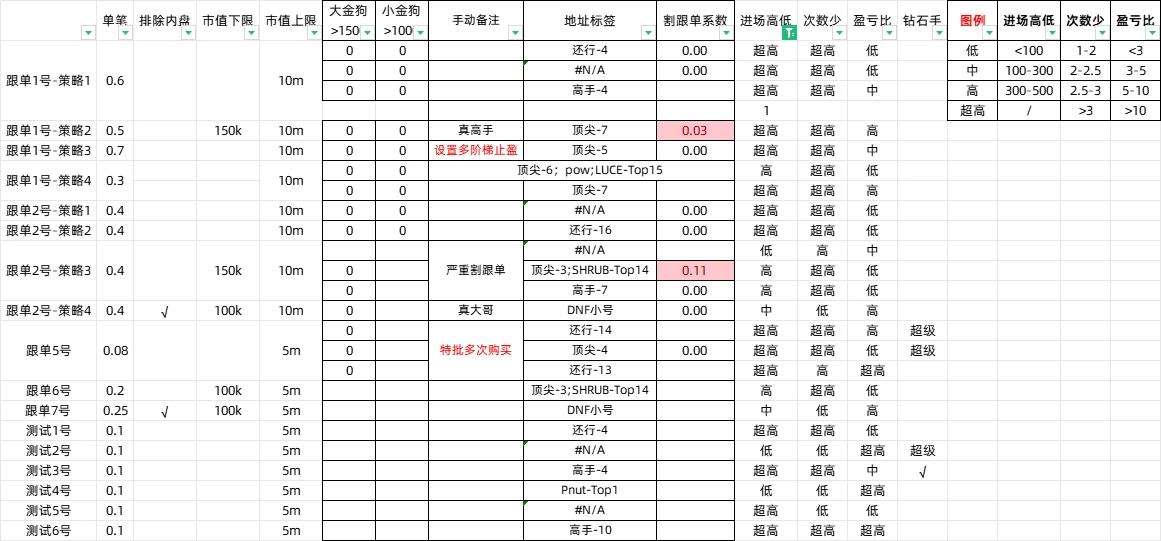Original | Odaily Planet Daily ( @OdailyChina )
Author|Nan Zhi ( @Assassin_Malvo )

Last week, after the introduction of the in-depth evaluation system , the stability of Copy Trading No. 1 and No. 2 was greatly improved, and they began to provide continuous financial support for other test accounts. Copy Trading No. 6 also achieved a nearly 5-fold increase in a week.
In this article, the author will update the progress of each wallet, show the copy address tracking chart, and update the upgrade status and future plans of the depth evaluation system.
Risk warning: This system was launched on October 8 and has only been running for 28 days. Although it has achieved certain results, from an objective perspective, the amount of data and control experiments are insufficient, and the rigor is limited. It is for readers reference only.
Funding progress and strategy presentation
As of 17:30 (UTC+8) on November 4, the funds of each address are as follows. The profitability and growth curve of each account are very different according to the style and strategy of the copy object. Among them , the copy No. 6 gained nearly five times the increase in a week under some special circumstances . For details, please see the next section.
This section will further demonstrate the specific copy trading plan and show the authors thinking in this process.

The tracking details of the copy trading object are shown in the figure below.
The left column is the strategy column , which has different settings based on the wallets profitability, purchase frequency, and internal market profitability.
The middle part is the label of actual combat result feedback and preliminary evaluation system .
The right column shows the labels based on the depth evaluation system (I) , and the label classification is shown in the legend in the upper right corner.
(Note: For details on the reasons for setting up the left column, please refer to Diamond Hands, High Profit and Loss Ratio? What are the Winning Factors for Solana Meme Trading? and Meme Training Manual: Rebirth: I Want to Be a Diamond Hand (Part 2) , and for details on the right column, please refer to Meme Training Manual: Rebirth: I Want to Be a Diamond Hand (Part 3) .)

A brief description of copy trading strategy
Copy orders No. 1 and No. 2 are low-frequency, high profit-loss ratio, diamond-hand addresses selected in the early stage , and the addresses with high drawdown were removed according to the guiding ideology of the third article . The effect after removal is currently acceptable. In 6 days, the profit rate of No. 1 increased from 725% to 908%, and the profit rate of No. 2 increased from 84% to 138%.
Copy order No. 5 is an extremely low-frequency address (only 11 purchases have been made so far), with a high profit-loss ratio and an extremely high diamond hand . These addresses have been successful in adding positions at high positions in the past, so they are the only addresses that allow multiple purchases and have lowered the single purchase amount. However, due to the limited number of total transactions, there is no summary of the impact on the profitability of the system.
Copy orders No. 6 and No. 7 originally copied the addresses ( elite strategy ) that won the most high-multiple tokens in No. 1 and No. 2. There are 3 addresses in total, which are called A, B, and C. One night, A first bought LUCE at a low price, and then B bought it at a high price. Or because the price was too high, B quickly stopped profit, resulting in the loss of all LUCE. However, in fact, address A continued to hold A until the highest price of 80 million US dollars in market value, and the potential profit loss was huge, so a one-wallet-one-copy order was split . Then, because C was too unstable and required a lot of financial support, it was eliminated.
Before the split of No. 6 and No. 7, wallet B (i.e. No. 7) purchased a certain token. Wallet B of this token performed a lot of profit-taking operations, but after the split, it no longer followed the operations of wallet B, so it gained unexpected gains and profits (about 50% of the total profit of No. 6). Therefore, although No. 6 increased five times in a week, No. 6 and No. 7 should actually be combined and compared with No. 2. After the combination, the increase in one week was 10.6 SOL (an increase of 132.5%), which still showed a certain advantage compared to the increase of 8.1 SOL of No. 2. (Note: The unexpected increase caused the author to plan to open a strategic buying and selling account for testing. Such accounts no longer follow the sale, but sell according to the percentage of increase.)
Tests 1 to 6 are used to test addresses that have outstanding highlights but lack stability . Their long-term purchasing power is tested by following orders with very small amounts. Once the account returns to zero, it will be liquidated and marked as unsuitable for following orders.
Version iteration
In-depth evaluation system (I)
In the third article , the author mentioned that in order to further analyze the address ’s ability to “buy at the bottom”, the risk of losing money due to “high-level FOMO”, the ability to make a small investment for a big gain, the stop-loss style, and the degree of “diamond hand” , an in-depth evaluation system (I) was launched.
Last week, the system further added two sub-modules: Follow-up effect test and internal market performance evaluation. The complete evaluation results of the system are shown in the figure below.

Among them, the copy trading effect test is still relatively superficial. Its calculation method is the total profit provided by GMGN divided by the number of transactions in the first round , and then the profit after each token conversion is accumulated to obtain the profit after conversion of each address.
(First round transaction number = number of transactions between the first purchase and the first sale, taken from GMGN-Address Data-Token Transaction Details. Transferring tokens is also considered selling .)

The reason for adopting this calculation method is that most copy trading systems only follow orders and buy once, so it is necessary to evaluate the profit changes under this style . After the conversion, the profit and loss decrease less or even increase, which is an ideal situation. The reason for the ideal situation is that the high-profit tokens of the copy trading object are purchased once after seeing the opportunity, and the high-loss tokens are caused by multiple positions.
The calculation method of Internal Market Performance Evaluation is also relatively crude at present. First, it counts whether the token is purchased in the Pump internal market, and calculates the winning rate and multiple based on the total profit and total cost of the token. The statistical purpose of this data is to evaluate whether to copy the internal market . Once the internal market participation rate is too high + internal market winning rate is high + internal market multiple is too low , the address is at risk of cutting the copy order . If the winning rate is low and the profit and loss ratio is not high , it means that the internal market trading level is low and the internal market should not be copied .
Future Outlook
There are still many areas that need to be improved in the copy trading system. The current plans include:
Copy trading effect test: secondary adjustment based on the input cost ratio, adding upper and lower limits of market value, aiming to truly simulate profitability under copy trading status.
Internal market performance evaluation: Introduce the cut-follow order evaluation system mentioned in the second article to further clarify the value of internal market follow-up while completing the level test.
Increased holdings warning system: Dynamically scan the positions of all Diamond Hand copied objects, report the tokens that are jointly held or increased by multiple wallets for a long time, and provide information for active transactions.










